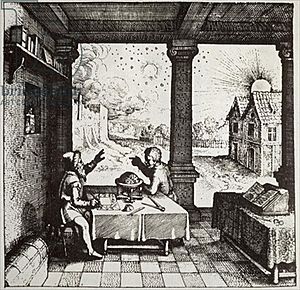Astrology facts for kids

Astrology is a way of thinking that claims to understand human events and what happens on Earth by looking at the movements of planets and stars. It's considered a pseudoscience, which means it's not based on scientific proof.
Astrology has been around for a very long time, at least since 2000 BCE. It started from ancient systems that helped people predict seasons and understand the sky as messages from gods. Many cultures, like the Hindus, Chinese, and Maya, believed that events in the sky were important. They created detailed ways to predict things on Earth based on what they saw in the sky.
Western astrology, which is still used today, began in Mesopotamia (a region in ancient Asia) around 1900-1700 BCE. From there, it spread to Ancient Greece, Rome, the Arab world, and then to Central and Western Europe. Today, Western astrology is often linked to horoscopes. These horoscopes claim to explain parts of a person's personality and predict important life events based on where the planets and stars were when they were born. Most professional astrologers use these systems.
For much of history, astrology was seen as a serious area of study. It was common in schools and often connected to astronomy, alchemy, meteorology, and medicine. It was also important in politics and appeared in many famous books by writers like Dante Alighieri, Geoffrey Chaucer, William Shakespeare, and Lope de Vega.
However, after the late 1800s, when the scientific method became widely used, scientists began to test astrology. They found that astrology doesn't have scientific proof or the ability to explain things. Because of this, astrology lost its place in academics and is no longer widely believed by scientists.
Astrological signs
Your astrological sign, often called your Sun sign, is based on your birthday. Here is a list of the main astrological signs:
| Sign | English name | Dates |
|---|---|---|
| Aries | The Ram | March 21 to April 20 |
| Taurus | The Bull | April 21 to May 21 |
| Gemini | The Twins | May 22 to June 21 |
| Cancer | The Crab | June 22 to July 22 |
| Leo | The Lion | July 23 to August 22 |
| Virgo | The Virgin | August 23 to September 23 |
| Libra | The Scales | September 24 to October 22 |
| Scorpio | The Scorpion | October 23 to November 22 |
| Sagittarius | The Archer/Centaur | November 23 to December 22 |
| Capricorn | The Sea-goat | December 23 to January 20 |
| Aquarius | The Water Carrier | January 21 to February 19 |
| Pisces | The Two Fish | February 20 to March 20 |
Images for kids
-
The Roman orator Cicero objected to astrology
-
1484 copy of first page of Ptolemy's Tetrabiblos, translated into Latin by Plato of Tivoli
-
Latin translation of Abū Maʿshar's De Magnis Coniunctionibus ('Of the great conjunctions'), Venice, 1515
-
Dante Alighieri meets the Emperor Justinian in the Sphere of Mercury, in Canto 5 of the Paradiso.
-
The medieval theologian Isidore of Seville criticised the predictive part of astrology.
-
Middle-class Chicago women discuss spiritualism. (1906)
-
A drawing of Avicenna
-
Title page of John Lyly's astrological play, The Woman in the Moon, 1597
-
Title page of Calderón de la Barca's Astrologo Fingido, Madrid, 1641
See also
 In Spanish: Astrología para niños
In Spanish: Astrología para niños
 | Audre Lorde |
 | John Berry Meachum |
 | Ferdinand Lee Barnett |











